The Real Cost of Insurance
How Out-of-Network Benefits & Private Pay Options Provide Enhanced Care
Deciding to go to treatment is a life-changing decision. Whether met with tears of frustration or gratitude, challenging yourself or a loved one to face their addiction head-on and rediscover themselves is a crucial first step. There are many treatment programs that serve a wide range of clients – from hospital-style medical facilities for Medicaid with 20 patients in a group to high-end private pay programming with small groups including one-on-one time with a personal therapist.

For clients with the means to afford it, the question is often, “What’s the value of paying privately or using more costly out-of-network benefits compared to an in-network provider covered mostly by insurance?” A good analogy may be the difference between sending your child to a run-of-the-mill public school versus sending them to an exclusive private school. Which one is likely to better set your child up for success? Of course, the private school with smaller class sizes, more experienced teachers, and better equipment. Because private schools charge more in tuition, they can afford to provide a higher quality education. Individuals with means choose more costly treatment programs for the same reasons they send their children to private instead of less costly public schools, the results are better.
For individuals who want small group sizes, frequent private therapy sessions, therapists with advanced degrees or specialized training in areas such as trauma, and a more luxurious environment, a higher-end program is the way to go. Programs like Tranquil Shores have expanded mental health resources and work to provide a larger variety of evidence-based therapies.
But how are programs able to do that? It comes down to how clients pay for treatment, which enables a program to invest more in its staff, facilities, and programming. Providers that accept in-network benefits are the lowest cost option as the cost of treatment is covered in full or in part. However, the contracted reimbursements often limit the facility in what they can offer and the services you will be able to receive. There are many differences in what private pay has to offer over in-network insurance benefits. This article will explore the differences between private pay, out-of-network, and in-network insurance and how that correlates to services provided, quality of care, and course of treatment.
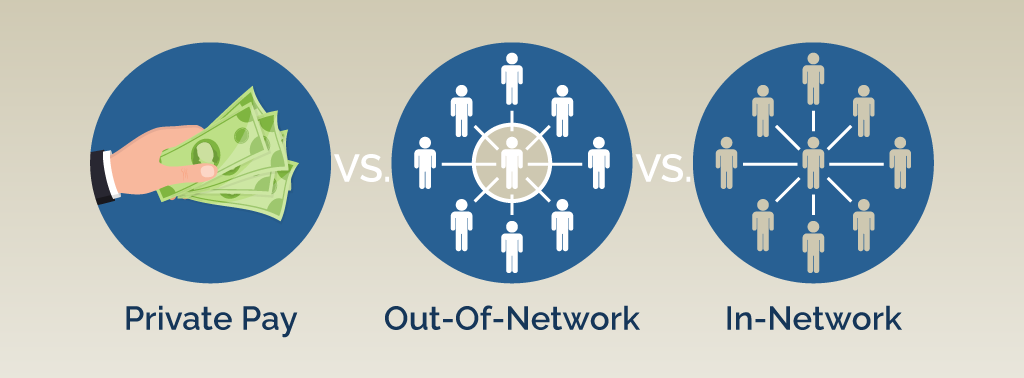
Private Pay Vs. Out-Of-Network Vs. In-Network Insurance
The three ways to pay for addiction treatment services are through private pay (also known as out-of-pocket), out-of-network insurance benefits, and in-network insurance benefits. In-network benefits cover a large portion or sometimes all of the costs associated with your run-of-the-mill, everyday treatment program.
For those for whom cost is a primary consideration, in-network may be the right choice, but the standard of care that can be provided is equally limited by the lower amount insurance reimburses that in-network treatment provider. This means potentially less experienced staff, higher patient-to-staff ratios, crowded accommodations, and reduced amenities compared to what a provider not locked into low, in-network reimbursement rates can provide.
Typically, your insurance company will have benefits already spelled out in terms of what they cover and up to how much, how many days, and which therapies. Out-of-network benefits can vary in coverage. Some providers will cover up to a certain amount while you cover the difference, others will not cover any treatments or services. Private pay means you cover all costs yourself, whether upfront or through a payment arrangement made with the provider. When it comes to addiction treatment, each of these types of payments can have pros and cons. Let’s take a look at this further.
Quality and Ability of Care
No matter the source of payment, all clients are entitled to quality care from a treatment provider. When we refer to quality of care, we are referring to limitations that can be put in place by insurance providers. For those utilizing their in-network benefits, their treatment path is limited by the restrictions in their plan benefits. The plan will outline something along the lines of “coverage for a 15-day inpatient stay, 8 total therapy visits, no coverage for any additional services, etc.” This ties the hands of care providers in what services they can and cannot perform and also gives them a set timeline for the course of treatment. The person may need more than their insurance covers, but they are unable to receive those treatment options.
Out-of-network benefits vary widely, and some clients may choose not to utilize their benefits if they do not cover everything. Others may use what the out-of-network covers and pay the difference. This also puts limits on the treatment path the care team can create. The benefits still have a spelled-out plan of what they will cover and what they will not. Private pay is one of the most versatile options when it comes to quality of care. The facility has a cost for each service rendered which is discussed before treatment begins. If the treatment team and the individual feel a different type of therapy would be more beneficial, they can add that service without having to file a claim and wait for an answer if their insurance will authorize the care. In this way, clients have a greater ability to seek the right treatment for them and allows the treatment team to provide quality suggestions for care.
Private pay and out-of-network benefits allow for more qualified staff. This not only means that individual therapy sessions happen more often, but it also means that different types of therapy can be offered. Trauma is a leading driver of addiction, and having specialized staff that specifically treat and address past trauma is a significant benefit. Other specialized areas of treatment can include animal-assisted therapy to encourage building routines. All of these offerings are more likely to exist in facilities that are private pay or out-of-network.
Private pay facilities have the capability to really maximize the treatments and services they provide. At an in-network provider, you may only meet with a psychiatrist once or twice in 30 days. Individual therapy sessions may only happen once per week, if at all. With private pay, you will be able to get the individual attention you deserve. Addiction didn’t happen overnight, and a couple of private therapy sessions are unlikely to be enough to begin untangling the years of stress, trauma, and chaos that stems from years spent in addiction. The goal is to find peace and healing in a holistic and spiritual setting. Private pay facilities like Tranquil Shores give you the individual care you seek, with individual therapy sessions at least two times per week, AND weekly doctor evaluations.
With in-network providers, the facility is not able to suggest or offer services that insurance does not deem billable. This means that the staff at the facility has to prove that a service is necessary and insurance then decides if it is or isn’t. Even if the client and care team feel a service is necessary and will benefit the client, insurance can deny the claim.
When looking for an in-network provider, two things can slow the process of actually getting into treatment. The facility has to send the claim to the insurance company and receive preauthorization before the client can be accepted into treatment. While it does not always happen, sometimes this slows the admission process. Another concern is that the facility may not have any space available. Finding an in-network provider with a bed available can take more time, and delay the admission process. When it comes to treating addiction, the client needs help at that moment. If treatment is delayed, they may choose not to go at all or risk facing repercussions from their continued use.
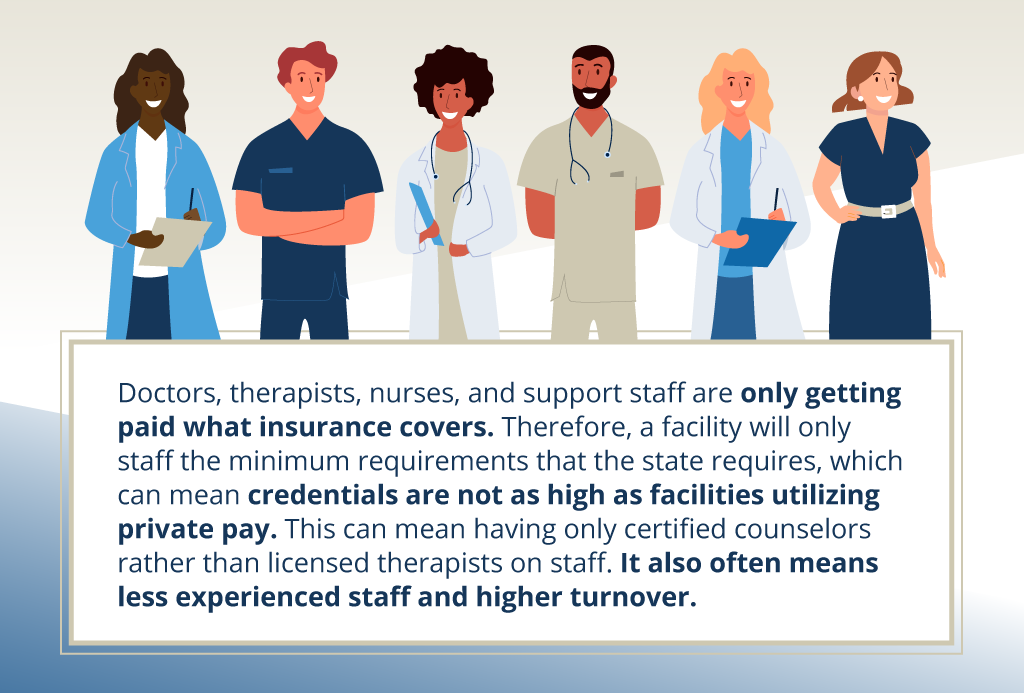
Staffing: Qualifications, Quantity, and Personalization
One of the downfalls of using in-network insurance is that you are getting what you pay for. Doctors, therapists, nurses, and support staff are only getting paid what insurance covers. Therefore, a facility will only staff the minimum requirements that the state requires, which can mean credentials are not as high as facilities utilizing private pay. This can mean having only certified counselors rather than licensed therapists on staff. It also often means less experienced staff and higher turnover. In some cases, in-network programs can’t even afford full-time therapists, medical directors, or psychiatrists – instead, they contract that out, with the provider coming in only one or two days a week. Therapists, doctors, and clinicians who are at in-network facilities already have a high number of clients. Because insurance pay is lower, they often work at multiple facilities to make up the difference in pay. This can extend their client load much higher, often leading to burnout.
When clients exercise out-of-network or private pay options, the facility has more flexibility to hire better staff. Doctors, therapists, and support staff are paid for the services they render, and there is no wait for insurance to reimburse them. This allows them to stay at one facility and also allows the facility to keep a large amount of staff. They can hire those with higher qualifications, such as those holding PhDs, or addictionologists. With these qualifications, the staff are more experienced in understanding and treating substance use and mental health disorders. In-network providers typically have clients see a therapist once per week. Due to the freedom and benefit of private pay, therapists can see their clients more often and get to know them more personally. This makes the treatment process more customizable and more likely to succeed.
When choosing a treatment facility, you want the best for yourself. While in-network facilities have doctors and psychiatrists, they are not at the facility at all times. Your individual needs may not always be met in a timely manner, and your care team may only see you once per week at an in-network facility. The benefit of private pay is that you get to be your own advocate while the facility provides for your needs and goals. Having doctors, psychiatrists, and higher-degreed therapists onsite guarantees you receive the individual attention you deserve.
Variations in Length of Stay
As stated above, in-network and out-of-network benefits put caps on the length of stay for addiction treatment. They may cover 10, 20, or 30 days, etc., but any amount after that is not covered. This can put a strain on you and the facility when trying to create a treatment path tailored to fit your needs. You may not be ready to transition from inpatient treatment to a lower level of care in only 30 days. The facility can work with you to figure out how to continue to make sure your needs are met in this instance, but they are tied to only insurance benefits. If an in-network provider decides it is time to move on to outpatient services, the facility has to do so, unless you decide to pay out-of-pocket.
When using private pay, the length of stay varies solely based on your needs. You can work with the facility to decide how long you will spend in inpatient treatment, if you need to go to intensive outpatient, or if you want to transition to outpatient. The length of stay is not set in stone by insurance coverage, and you work with the facility to create a recovery path that fits your goals. Having this flexibility helps you transition through the stages of treatment with no worries of claims or approval, allowing for a seamless recovery stay.
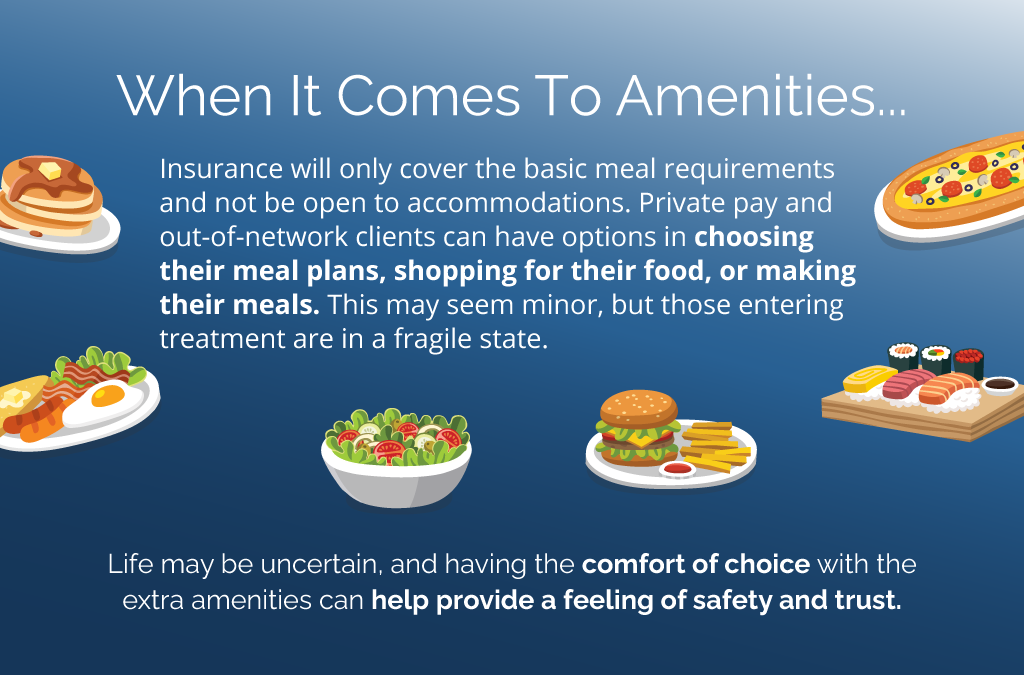
The Details: Amenities and Services Provided
The amenities that a facility can offer vary depending on the primary payment method. This is for the simple fact that in-network insurance needs to see a service as a necessity to make it billable. It does not matter if the service is evidence-based or not, it only depends on the insurance company. A client can find cognitive-behavioral therapy (CBT) very effective, but their insurance only sees a need for two sessions in 30 days. This is where services provided can be limited with in-network benefits while private pay and out-of-network have more freedom and customization.
When it comes to amenities, in-network coverage can also put a limit on what is billable. Clients may be used to eating a certain diet or have requests that basic kitchens cannot provide. Insurance will only cover the basic meal requirements and not be open to accommodations. Private pay and out-of-network clients can have options in choosing their meal plans, shopping for their food, or making their meals. This may seem minor, but those entering treatment are in a fragile state. Life may be uncertain, and having the comfort of choice with the extra amenities can help provide a feeling of safety and trust.
In-network facilities also do not typically offer personal accommodations. Many in-network facilities need higher bed counts to be able to afford the staff they have. This means dormitory-style living, with 2, 4, or even 6 people sharing the same living space. Clients are often from very different backgrounds, and lifestyle clashes are bound to happen. With private pay, facilities can offer more private and secluded recovery spaces. Many have private suites where you have your own living space and can focus on your own healing. Personalization to fit your wants is a higher standard with private pay facilities. At Tranquil Shores, you will reside in a beachside condo that includes a kitchen and dining area, as well as direct access to the beach.
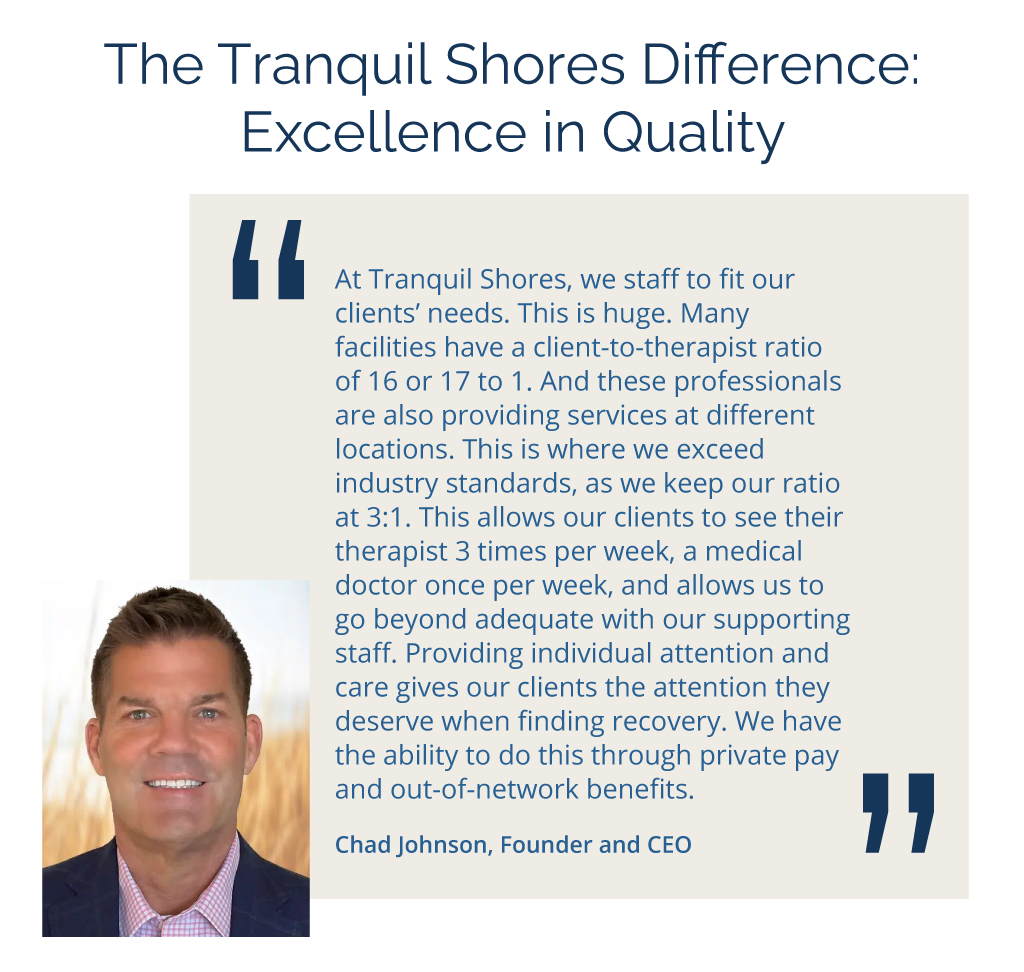
The Tranquil Shores Difference: Excellence in Quality
Tranquil Shores has been providing quality substance use disorder treatment for years in Madeira Beach, Florida. We have served doctors, lawyers, small business owners, executives, and many other working professionals over a decade of providing quality care. Founder and CEO Chad Johnson had this to say about how Tranquil Shores goes above and beyond:
“At Tranquil Shores, we staff to fit our clients’ needs. This is huge. Many facilities have a client-to-therapist ratio of 16 or 17 to 1. And these professionals are also providing services at different locations. This is where we exceed industry standards, as we keep our ratio at 3:1. This allows our clients to see their therapist 3 times per week, a medical doctor once per week, and allows us to go beyond adequate with our supporting staff. Providing individual attention and care gives our clients the attention they deserve when finding recovery. We have the ability to do this through private pay and out-of-network benefits.”
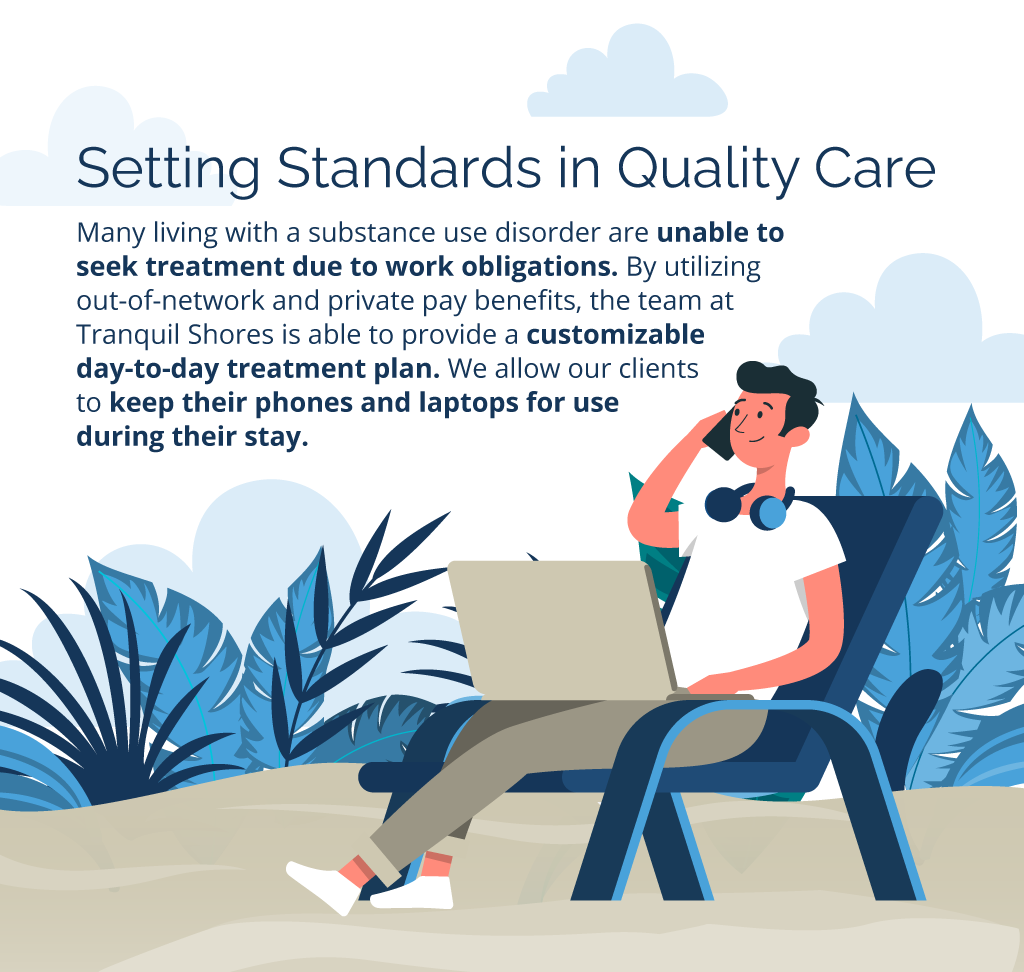
Setting Standards in Quality Care
Insurance will only cover what they deem as a billable service. Many living with a substance use disorder are unable to seek treatment due to work obligations. By utilizing out-of-network and private pay benefits, the team at Tranquil Shores is able to provide a customizable day-to-day treatment plan. We allow our clients to keep their phones and laptops for use during their stay. This is a benefit that insurance would not cover and possibly see as a reason treatment is not needed. By working with each client on an individual level, we can better accommodate their needs while also providing life-changing treatment.
Another way Tranquil Shores sets the bar high is by offering more therapies than the average treatment facility. With experiential therapies such as art and music, beach-centered activities, adventure, and dance therapies, Tranquil Shores broadens the horizons of our clients through methods they would not have ever thought of. Substance use disorders can take over a client’s life in all aspects, and the more evidence-based therapies a facility can offer, the higher the likelihood of success in recovery. Insurance does not always approve these therapies even though they are proven to aid in the recovery process. This is how Tranquil Shores utilizes private pay and out-of-network benefits to provide the most beneficial services for their clients.
When it comes to using in-network benefits, the facility has to prove the client even needs treatment in the first place. You become a name on a piece of paper at a claims office, where they have no idea who you are or what you have been through. By utilizing private pay, Tranquil Shores has the privilege of learning about you as a whole person – what makes you tick, what are you passionate about, and what you want to accomplish in recovery. Every addiction story is unique, and with the help of private pay, Tranquil Shores keeps the focus and attention where it belongs, on you and your success.
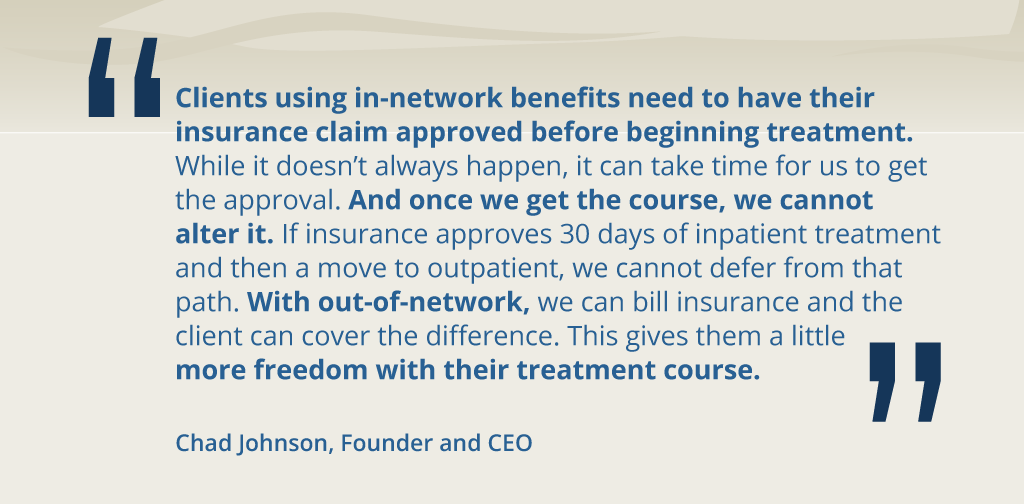
Cutting Out the Middleman: Private Pay Serves an Advanced Timeline
When it comes to getting into treatment today, Mr. Johnson has this to say:
“Clients using in-network benefits need to have their insurance claim approved before beginning treatment. While it doesn’t always happen, it can take time for us to get the approval. And once we get the course, we cannot alter it. If insurance approves 30 days of inpatient treatment and then a move to outpatient, we cannot defer from that path. With out-of-network, we can bill insurance and the client can cover the difference. This gives them a little more freedom with their treatment course.”
As we discussed, a person wanting to get into treatment needs options at that moment. Waiting for an insurance claim or a bed at a facility can take time. This is time that the client may not have. Tranquil Shores works with each client to find the best path of treatment that fits their individual needs and gets them the help they need as soon as possible.
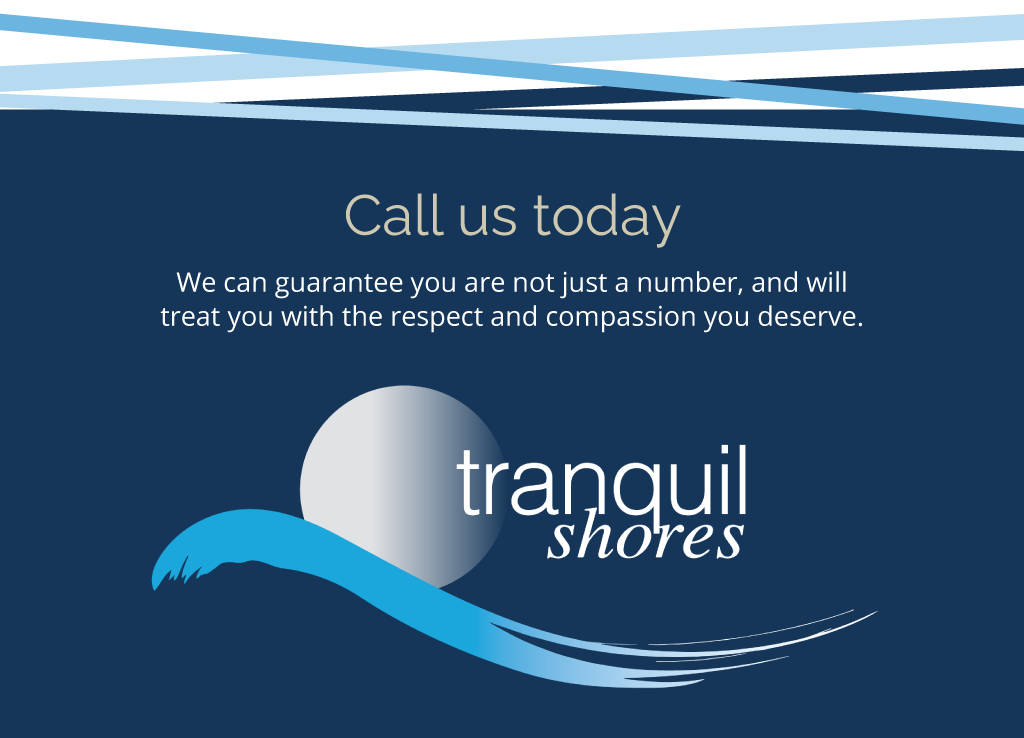
Care Is Care – But Private Pay Opens More Doors
Finding a treatment facility in-network with your insurance can feel like the best option at the moment. Taking time to learn what is covered and what is not can open the door to see that the services are basic, and may not provide what you need to heal. By having access to all therapies and services provided, recovery will be more achievable and sustainable. The saying goes “You get what you pay for,” and in the case of addiction treatment, it is best to have access to everything than find out what you need is not covered. You deserve the highest caliber of care, and private pay is the most successful way of guaranteeing that your care exceeds expectations.
Tranquil Shores has been providing quality addiction treatment in Pinellas County, Florida, and is here to help. By utilizing private pay and out-of-network coverages, we are able to provide a treatment experience that includes access to all therapies, private residences, and excellent quality amenities that give you the best outcomes in recovery. Our dedicated staff is here to help you navigate what course will work best for you and help you customize what services will suit your needs. We can guarantee you are not just a number, and will treat you with the respect and compassion you deserve. Call us today at 727-391-7001 to learn more or to schedule an appointment.
Your Recovery Starts Today

![meritain-health-logo-vector[3]](https://www.tranquilshores.org/wp-content/uploads/2022/10/meritain-health-logo-vector3.png)

![blue-cross-blue-shield-1-logo-png-transparent[2]](https://www.tranquilshores.org/wp-content/uploads/2022/10/blue-cross-blue-shield-1-logo-png-transparent2.png)











